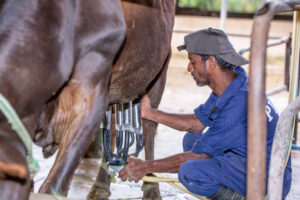
Pelwatte Dairy, one of the leading local dairy brands in Sri Lanka that produces a range of dairy goods and saves valuable foreign exchange for the country, is a forerunner in quality and productivity development of local dairy farmers. The dairy leader plans to achieve this through a Project/Program/Initiative that is focused on training, development and empowerment of the farming community it works with.
The new Project aims to develop a well-equipped dairy training centre with the collaboration of international dairy training providers and to improve the herd with modern breeding techniques. A cornerstone of the Project is to develop dairy farmers’ infrastructure to comply with Good Dairy Farming Practices introduced by world Food and Agriculture Organization (FAO).
Chamila Rajapaksha, the Farm Manager at Pelwatte Dairy Industries elaborates: “The Pelwatte Dairy Training Program aims to develop a well-equipped dairy training centre in collaboration with international dairy training service providers. The existing farms will be enhanced as a cattle breeding farm to supply high quality breeding materials to the Sri Lankan dairy farmers. It is little doubt that quality training and awareness provision on such aspects as high yield dairy breeding and livestock management are essential inputs to update farmers’ knowledge in par with the rest of the industry and global trends. Regular knowledge updates are essential not only on breeding techniques but even on dairy quality maintenance and preservation, feeding and wellbeing of the cattle. During the COVID pandemic, farmgate supply chains were disrupted. Despite this, demand for Pelwatte dairy products increased during lockdowns and our farmers’ workload, revenues and need for new dairy farming knowledge too increased along with it. Meanwhile new dairy substitutes such as soy milk and almond milk are entering the market everywhere in the world and it is important for dairy producers such as Pelwatte to highlight the superior quality and nutrition of dairy products, in comparison to such substitutes. Most importantly, the world is increasingly embracing sustainability, and it is time our committed farmers learn to adopt the best practices in this regard. The Pelwatte Dairy Training Project aims to fill such knowledge gaps as well.”
Chamila Rajapaksha adds: “Dairy products have a direct relevance to consumers’ digestive health and their general wellbeing. Therefore, we believe that the safety of consumers who use Pelwatte products to be of utmost importance. Farm assurance on the quality of dairy products is one of the best things a dairy producer offer its customers, which the customers also look forward to.”
The Good Dairy Farming Practices of world Food and Agriculture Organization (FAO) addresses such farming aspects as milking hygiene, animal health, nutrition (feed and water), sensitive animal husbandry practices, environment concerns, and ensuring the sustainability with socio-economic management. Among these, Pelwatte is moving forward first with milking, addressing environment concerns and training.
Adds Chamila Rajapaksha, “Major area of our new business strategy is to convert our farm as a well-equipped Dairy Education and Training Centre. We plan to established training complex with a lecture hall, laboratories, dining areas and accommodation facilities. We look forward to register it as a Vocational Training Centre after which we will offer a globally reputed certificate to the course participants. The training provided will result in technology transfer to local farmer community. The knowledge transferred shall be about modern dairy farming technologies. The recipients will be the Sri Lankan dairy farmers and young entrepreneurs who are willing to be engaged in dairy based industries.”
Milking is the most important practice in a dairy farm and a good milking facility ensures best milk from the dairy cattle. Pelwatte has a line milking parlor facility with 4 units and is sufficient to maintain a satisfied cow herd as milking is completed within three hours. With Pelwatte’s planned herd improvement, the farm requires minimum 6 x 2 Herringbone Milking Parlor.
Addressing environment concerns is not new to Pelwatte, and it already set up a compost making project as a waste management technique. “Our facility produces minimum 60 tons of compost per month increasing farm profitability at the same time” says Chamila Rajapaksha
Pelwatte is now looking to automate the project and is planning to acquire a tractor with a trailer, a pile tuner and an excavator.
About Pelwatte Dairy:
Having set up in 2006, Pelwatte Dairy, which specializes in milk processing, animal feed and dairy products is one of the Sri Lankan brands that successfully saves the outflow of foreign exchange for dairy product imports from abroad. The Company is ambitious to develop the dairy cattle husbandry in Sri Lanka with a view to establish a continuous and trustworthy flow of quality raw materials to the dairy industry. An ISO 22000:2018 certified Company, Pelwatte Dairy owns one of the most modern dairy factories (designed around Danish technology) that operates in Sri Lankan dairy sector at present.
